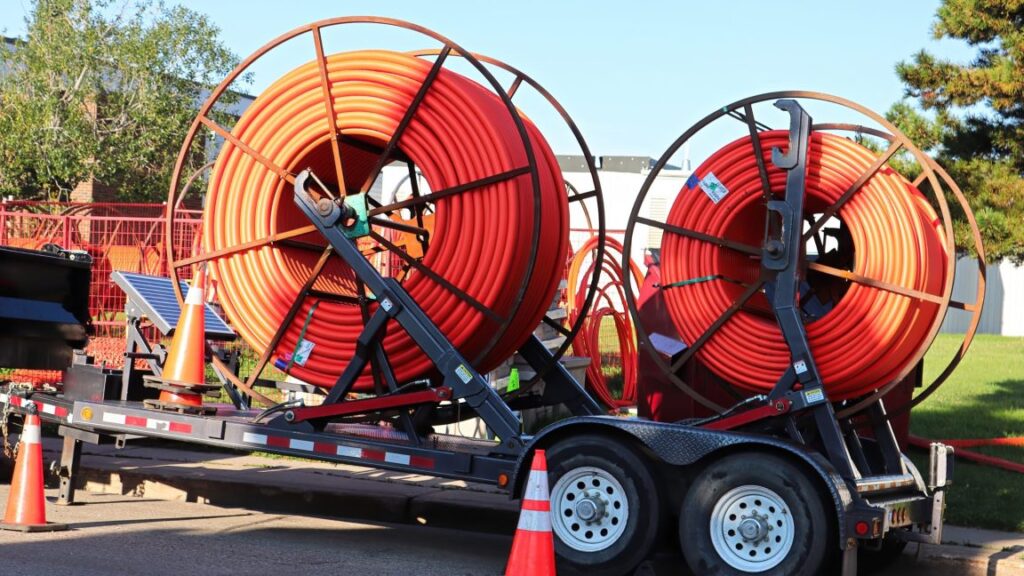SpaceX sends list of demands to US states giving broadband grants to Starlink
SpaceX won’t make specific promises on Starlink network capacity or subscribers.
A Starlink user terminal during winter. Credit: Getty Images | AntaresNS
SpaceX has made a new set of demands on state governments that would ensure Starlink receives federal grant money even when residents don’t purchase Starlink broadband service.
SpaceX said it will provide “all necessary equipment” to receive broadband “at no cost to subscribers requesting service,” which will apparently eliminate the up-front hardware fee for Starlink equipment. But SpaceX isn’t promising lower-than-usual monthly prices to consumers in those subsidized areas. SpaceX pledged to make broadband available for $80 or less a month, plus taxes and fees, to people with low incomes in the subsidized areas. For comparison, the normal Starlink residential prices advertised on its website range from $50 to $120 a month.
SpaceX’s demands would also guarantee that it gets paid by the government even if it doesn’t reserve “large portions” of Starlink network capacity for homes in the areas that are supposed to receive government-subsidized Internet service. Moreover, SpaceX would not be responsible for ensuring that Starlink equipment is installed correctly at each customer location.
SpaceX sent a letter to state broadband offices proposing a rider with terms that it hopes will be applied to all grants it receives throughout the country. The letter was obtained and published by Broadband.io and the Benton Institute for Broadband & Society.
Arguing that SpaceX should receive grant money regardless of whether residents purchase Starlink service, the letter to states said that grant payments should not depend on “the independent purchasing decisions of users.” SpaceX also said it will not hold “large portions of capacity fallow” to ensure that people in subsidized areas receive good service, but will instead continue its preexisting practice of “dynamically allocat[ing] capacity where needed.”
SpaceX capitalizes on Trump overhaul
SpaceX’s proposed contract rider would apply to grants distributed under the US government’s Broadband Equity, Access, and Deployment (BEAD) program. BEAD was created by Congress in a 2021 law that authorized spending over $42 billion to make broadband networks available in areas without modern service.
While the Biden administration designed the program to prioritize fiber deployments, the Trump administration threw out the previous plans. Under Trump, the National Telecommunications and Information Administration (NTIA) deemed the Biden-era plan too costly and changed the rules to make it easier for satellite services to obtain grant funding. The overhaul cut projected spending to about $21 billion, and it’s still not clear what will happen to the other $21 billion.
Starlink sought billions in grants after the new rules were put in place, but states didn’t want to provide that much. So far, SpaceX is slated to receive $733.5 million to offer broadband at 472,600 locations. Amazon’s Leo satellite service (formerly Kuiper) is set to receive $311 million for 415,000 locations.
While not every state plan is final, it looks like satellite networks will get about 5 percent of the grant money and serve over 22 percent of locations funded by grants. Satellite companies are getting smaller payments on a per-location basis because, unlike fiber providers, they don’t have to install infrastructure at each customer’s location.
The concessions sought by SpaceX “would limit Starlink’s performance obligations, payment schedules, non-compliance penalties, reporting expectations, and labor and insurance standards,” wrote Drew Garner, director of policy engagement at the Benton Institute. Garner argued that SpaceX’s demands illustrate problems in how the Trump NTIA rewrote program rules to increase reliance on low-Earth orbit (LEO) satellite providers.
“BEAD was designed primarily to deploy terrestrial networks, which are physically located in communities, built with traditional construction methods, and are relatively easy to monitor and inspect,” Garner wrote. “But, on June 6, 2025, NTIA restructured BEAD in ways that greatly increased participation by LEO providers, exacerbating the challenge of applying BEAD’s terrestrial-focused rules to LEO’s extraterrestrial networks.”
SpaceX: Labor rules shouldn’t apply to us
Among other things, SpaceX is trying to “minimize states’ ability to penalize LEO grantees for defaulting or failing to comply with contract requirements,” and avoid having “to report on the use of BEAD funds or other financial information related to the grant,” Garner wrote.
SpaceX’s letter said that “all requirements related to labor issues (e.g., prevailing wage and similar obligations), contractors, and procurement are inapplicable to SpaceX” because “there are no identifiable employees, contractors, or contracts being funded” to support Starlink broadband service in each state. Similarly, “there are no identifiable pieces of SpaceX infrastructure equipment (other than satellite capacity delivered from Space) being funded via BEAD,” the company said.
It’s not clear whether SpaceX will turn down grants if it doesn’t get what it wants. We asked the company for information on its plans if states refuse its terms and will update this article if we get a response. SpaceX’s proposed terms could also be applied to Amazon if states accept them.
SpaceX’s letter said that despite the Trump administration’s changes to BEAD, “a number of issues remain that, if unaddressed, could render LEO participation in the program untenable.” SpaceX said it wants to work with states “to more fully tailor aspects of the project agreement to the reality of LEO deployment and operations now that the initial project selection and approval phase is accomplished.”
Space said it wants to avoid extensive negotiations over its proposed terms. But the acknowledgement that some negotiation may be necessary seems to recognize that states don’t have to comply with the demands:
Toward this goal, we have developed a set of terms that we intend to function as a rider to all subgrant agreements across the country. This rider is intentionally limited in scope to addressing items of critical importance, to minimize the need for negotiation, and provide clarity to both parties moving forward. Our intention is for the LEO rider to enable the state to keep its core subgrant agreement relatively uniform amongst grantees, retain state-law-specific requirements, co-locate all relevant LEO-specific material for ease of administration, and standardize agreements across states.
Low-income plan: $80 plus taxes and fees
SpaceX’s proposed contract rider said the firm will offer broadband plans for “a monthly cost of $80 or less before applicable taxes and fees” to households that meet the low-income eligibility guidelines used by the FCC’s Lifeline program. People who don’t qualify for low-income plans would presumably pay regular Starlink rates.
The BEAD law requires ISPs receiving federal funds to offer at least one “low-cost broadband service option for eligible subscribers.” While the Biden administration sought low-income plans that cost as little as $30 a month, the Trump administration decided that states may not tell ISPs what prices to charge in their low-cost options. A Trump administration threat to shut states out of BEAD if they required low prices doomed a California proposal to mandate $15 monthly plans for people with low incomes.
SpaceX told state governments that it should receive 50 percent of grant funds when it certifies that it is capable of providing BEAD-quality service (100Mbps download and 20Mbps upload speeds) within 10 business days to any potential customer that requests it in a grant area. The rest of the money would be distributed quarterly over the 10-year period of the grant.
Explaining why SpaceX shouldn’t be penalized if potential customers decide Starlink prices are too high, the firm wrote:
Tying payments to the independent purchasing decisions of users solely for awardees using LEO technologies, and not for any other technology, is, by definition, not technology neutral. SpaceX is already appropriately incentivized to gather customers by the opportunity to capture the monthly recurring revenue from each subscriber. SpaceX was in most instances awarded the most remote and difficult areas to serve among all other providers. SpaceX is up to the task of ensuring success in these challenging areas, however, it cannot undertake this mission without certainty of consistent payments to compensate such work.
Based on SpaceX’s letter, it sounds like the work the company must do to ensure quality of service at BEAD-funded locations is the same work it has already done to make Starlink available across the US. Instead of dedicated capacity for government-subsidized deployments, SpaceX said it will simply factor the needs of BEAD users into its planning:
With respect to capacity reservations, we have found some confusion regarding how such a reservation is made. Given the dynamic nature of the Starlink network, the reservation will not be such that SpaceX holds large portions of capacity fallow. This would be wasteful, inefficient, and does not reflect a LEO providers [sic] ability to dynamically allocate capacity where needed. Instead, SpaceX will include the capacity needs of BEAD users into its network planning efforts. These activities are multifaceted and include real time capacity allocation at the network level, launch activities, and sales efforts. As a result, there is no single “document” evidencing the reservation of capacity.
SpaceX wants limits on performance testing
SpaceX said it will be obvious if it does not provide sufficient service, and thus the states should not seek additional performance testing beyond what’s included in the NTIA guidelines. “If sufficient capacity was not reserved, performance testing will reveal insufficient quality of service, and this deficiency will be transparent to the state. Developing a separate, indirect measurement of the reservation itself is infeasible and unnecessary,” SpaceX said.
The proposed rider said that any network testing must “exclude subscribers who have installed CPE [consumer premise equipment] such that its view of the sky is obstructed and subscribers with damaged or malfunctioning CPE, as determined by GRANTEE.”
The “as determined by GRANTEE” phrase means it’s up to SpaceX to decide which subscribers should be excluded from testing. As the Benton Society says, the rider stipulates that “performance tests can only be considered if the LEO provider determines that the subscriber’s equipment is properly installed, and, notably, the LEO provider is not obligated to ensure proper installation.”
SpaceX’s proposed rider defines a “standard installation” as the mailing of equipment to a subscriber. That’s the standard process for un-subsidized areas throughout the country, and SpaceX doesn’t want to do any extra work to help set up equipment for customers in subsidized areas. However, customers may be able to purchase professional installation for an extra fee.
“For the avoidance of doubt, the GRANTEE will not be responsible for completing a permanent installation” at each location, SpaceX’s proposed rider says. A satellite provider “may choose to offer the subscriber professional services for permanent installation of CPE at an additional fee, but such professional services shall not be considered part of the standard installation,” it says.
SpaceX sends list of demands to US states giving broadband grants to Starlink Read More »










